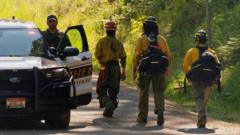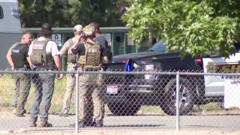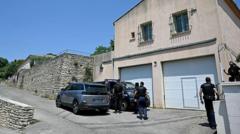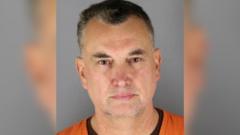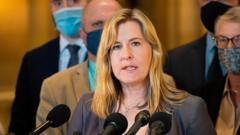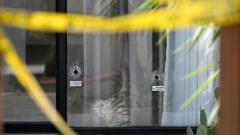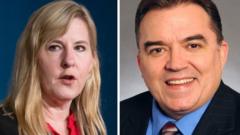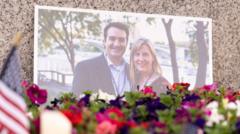A recent attack resulting in the deaths of Democratic politician Melissa Hortman and her husband has shattered Minnesota's long-standing image of politeness, redefining the state's political atmosphere.
Minnesota's Political Landscape Faces Turmoil Amid Violence

Minnesota's Political Landscape Faces Turmoil Amid Violence
In the wake of a tragic double homicide, Minnesota grapples with the eruption of political violence, threatening the state's reputation for civility.
---
In an emotional tribute, Jessie Ebertz stood by a makeshift memorial at the Minnesota state legislature honoring Democratic House Speaker Melissa Hortman and her husband, Mark, who were tragically murdered last Saturday. "Minnesota has felt like a safe haven," reflected Ebertz, "because we have been able to keep our atmosphere of respecting one another here. This has blown that out of the water."
The shocking incident, which involved the couple being shot by an assailant disguised as a police officer, has sent tremors throughout the state. The attack, considered politically motivated, has escalated fears, even leading to the injury of state lawmaker John Hoffman and his wife, who are expected to recover.
The state's overwhelming manhunt for the perpetrator, Vance Boelter, culminated in his arrest on Sunday, about an hour outside the Twin Cities area. Prosecutors uncovered that Boelter had previously sought out other politicians' homes on the night of the shooting, sparking concerns over the growing hostility in the political sphere.
Melissa Hortman was well-respected for her collaborations with Republican lawmakers, including recent bipartisan efforts to push through a state budget. Her abrupt and tragic death is prompting deep reflection on Minnesota's political climate, previously characterized by the well-known "Minnesota nice" ethos.
Jenna Stocker of the conservative think tank Center of the American Experiment pointed out that political tensions, once considered outside Minnesota's paradigm, have begun to seep in. She noted, "Some people even here in Minnesota have really let politics guide their thinking," leading to a fracture in community relationships.
The escalating trend of political violence in the U.S. mirrors an alarming nationwide upsurge; since the January 2021 Capitol riot, over 300 instances of politically motivated aggression have been documented. Recent studies indicate that up to 40% of state legislators reported experiencing threats within the past three years.
Despite fears of violence during subsequent elections, Minnesota's societal fabric, which once flourished with openness, now feels precarious. Local reactions to the attacks range from mourning to an urgent call for renewed peaceful dialogue. Inside the Capitol, the usual bustling atmosphere is notably subdued, as mourners surround heartfelt memorials with messages like "Demand Change" and "Rest in Power."
While the community navigates this crisis, national conversations on political rhetoric persist, with figures like President Trump making inflammatory comments instead of extending solidarity. In a further twist, partisan attacks have compounded vulnerabilities, as Trump supporters have attempted to tie the recent murders to Minnesota's Democratic leadership without substantiated claims.
Boelter's apprehension offers some relief, yet the broader discussion on how to de-escalate political tensions in Minnesota has become prominent in public discourse. With a cultural shift necessary to restore unity, Minnesota residents are urged to take a stand against the intensifying divisiveness.
Kameko White, a neighbor to Boelter, expressed the community's horror over the violence, stating, "It's terrifying. I saw that man every day in his yard." Calls for change resonate strongly, with editor Jenna Stocker declaring, "It's going to take a whole generation of people to say we're not going to take this any more. It just needs to stop."
In an emotional tribute, Jessie Ebertz stood by a makeshift memorial at the Minnesota state legislature honoring Democratic House Speaker Melissa Hortman and her husband, Mark, who were tragically murdered last Saturday. "Minnesota has felt like a safe haven," reflected Ebertz, "because we have been able to keep our atmosphere of respecting one another here. This has blown that out of the water."
The shocking incident, which involved the couple being shot by an assailant disguised as a police officer, has sent tremors throughout the state. The attack, considered politically motivated, has escalated fears, even leading to the injury of state lawmaker John Hoffman and his wife, who are expected to recover.
The state's overwhelming manhunt for the perpetrator, Vance Boelter, culminated in his arrest on Sunday, about an hour outside the Twin Cities area. Prosecutors uncovered that Boelter had previously sought out other politicians' homes on the night of the shooting, sparking concerns over the growing hostility in the political sphere.
Melissa Hortman was well-respected for her collaborations with Republican lawmakers, including recent bipartisan efforts to push through a state budget. Her abrupt and tragic death is prompting deep reflection on Minnesota's political climate, previously characterized by the well-known "Minnesota nice" ethos.
Jenna Stocker of the conservative think tank Center of the American Experiment pointed out that political tensions, once considered outside Minnesota's paradigm, have begun to seep in. She noted, "Some people even here in Minnesota have really let politics guide their thinking," leading to a fracture in community relationships.
The escalating trend of political violence in the U.S. mirrors an alarming nationwide upsurge; since the January 2021 Capitol riot, over 300 instances of politically motivated aggression have been documented. Recent studies indicate that up to 40% of state legislators reported experiencing threats within the past three years.
Despite fears of violence during subsequent elections, Minnesota's societal fabric, which once flourished with openness, now feels precarious. Local reactions to the attacks range from mourning to an urgent call for renewed peaceful dialogue. Inside the Capitol, the usual bustling atmosphere is notably subdued, as mourners surround heartfelt memorials with messages like "Demand Change" and "Rest in Power."
While the community navigates this crisis, national conversations on political rhetoric persist, with figures like President Trump making inflammatory comments instead of extending solidarity. In a further twist, partisan attacks have compounded vulnerabilities, as Trump supporters have attempted to tie the recent murders to Minnesota's Democratic leadership without substantiated claims.
Boelter's apprehension offers some relief, yet the broader discussion on how to de-escalate political tensions in Minnesota has become prominent in public discourse. With a cultural shift necessary to restore unity, Minnesota residents are urged to take a stand against the intensifying divisiveness.
Kameko White, a neighbor to Boelter, expressed the community's horror over the violence, stating, "It's terrifying. I saw that man every day in his yard." Calls for change resonate strongly, with editor Jenna Stocker declaring, "It's going to take a whole generation of people to say we're not going to take this any more. It just needs to stop."






